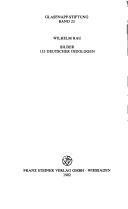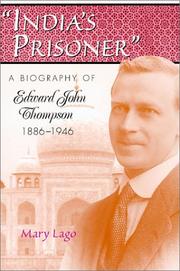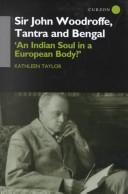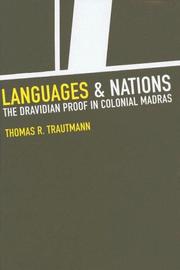| Listing 1 - 10 of 12 | << page >> |
Sort by
|

ISBN: 3515038647 9783515038645 Year: 1982 Volume: 23 Publisher: Wiesbaden: Steiner,
Abstract | Keywords | Export | Availability | Bookmark
 Loading...
Loading...Choose an application
- Reference Manager
- EndNote
- RefWorks (Direct export to RefWorks)
Indologists --- Portraits --- Indian studies specialists --- Asianists --- Tamilologists --- Indologists - Germany - Portraits

ISBN: 0826263313 9780826263315 9780826212993 0826212999 Year: 2001 Publisher: Columbia University of Missouri Press
Abstract | Keywords | Export | Availability | Bookmark
 Loading...
Loading...Choose an application
- Reference Manager
- EndNote
- RefWorks (Direct export to RefWorks)
Indologists --- Authors, English --- Indian studies specialists --- Asianists --- Tamilologists --- Thompson, Edward John, --- Thompson, Edward, --- Thompson, Edward Joseph,

ISBN: 128371129X 0203037189 1136120904 9781136120909 9780203037188 070071345X 9780700713455 9781136120985 113612098X 9781136121067 1136121064 9780415749367 0415749360 Year: 2001 Publisher: Richmond Curzon
Abstract | Keywords | Export | Availability | Bookmark
 Loading...
Loading...Choose an application
- Reference Manager
- EndNote
- RefWorks (Direct export to RefWorks)
Working with Bengali mentors, especially his close friend A. B. Ghose, Sir John Woodroffe became the pseudonymous orientalist Arthur Avalon, famous for his tantric studies at the beginning of the twentieth century. Best known for The Serpent Power, the book which introduced 'Kundalini Yoga' to the western world, Avalon turned the image of Tantra around, from that of a despised magical and orgiastic cult into a refined philosophy which greatly enhanced the prestige of Hindu thought to later generations of westerners.This biographical study is in two parts. The first focuses on
Indologists --- Indian studies specialists --- Asianists --- Tamilologists --- Woodroffe, John George, --- Avalon, Arthur, --- Bengal (India) --- Bengal --- Fort William (India) --- Presidency of Fort William (India) --- Bengale (India) --- Baṅgāla (India) --- Eastern Bengal and Assam (India) --- West Bengal (India) --- East Bengal (Pakistan)
Book
ISBN: 1463240503 9781463240509 9781463240493 146324049X Year: 2020 Publisher: Gorgias Press
Abstract | Keywords | Export | Availability | Bookmark
 Loading...
Loading...Choose an application
- Reference Manager
- EndNote
- RefWorks (Direct export to RefWorks)
This work is a result of study for the doctoral degree of the Savitribai Phule Pune University, Pune, India. The author is the Assistant Curator of the Bhandarkar Oriental Research Institute, Pune, where the manuscripts collected by Georg Bühler are deposited. Along with source materials available in India, she consulted those in Germany and Austria. This work deals with the life and pioneering work of Georg Bühler in the various fields of Indology. The book argues that Bühler's interactions with the 19th c. India influenced his approach as a researcher and in turn his methodology which then followed his self-developed path of Ethno-Indology.
Indologists --- HISTORY / Asia / General. --- Indian studies specialists --- Asianists --- Tamilologists --- Bühler, Georg, --- Бюлер, Г., --- Bi︠u︡ler, G., --- Bühler, Johann Georg, --- Bühler, G. --- بهلر --- India --- Study and teaching.
Book
ISBN: 9780199532001 0199532001 0191730904 1283352273 9786613352279 0191617326 Year: 2011 Publisher: Oxford: Oxford university press,
Abstract | Keywords | Export | Availability | Bookmark
 Loading...
Loading...Choose an application
- Reference Manager
- EndNote
- RefWorks (Direct export to RefWorks)
Jones, William --- Asianists --- Indologists --- Sanskritists --- Jones, William, --- Scholars --- Indian studies specialists --- Tamilologists --- Iones, Guilielmus, --- Jones, Guilielmus, --- Jones, Oriental, --- Jones, W. --- Iones, Guilielmus --- Jones, Guilielmus --- Jones, Oriental --- Asianists - Great Britain - Biography --- Indologists - Great Britain - Biography --- Sanskritists - Great Britain - Biography --- Jones, William, - Sir, - 1746-1794
Multi
ISSN: 19579683 ISBN: 9782843102141 2843102146 Year: 2011 Volume: *5 Publisher: Grenoble: Ellug,
Abstract | Keywords | Export | Availability | Bookmark
 Loading...
Loading...Choose an application
- Reference Manager
- EndNote
- RefWorks (Direct export to RefWorks)
Jones, William, --- Indologists --- Orientalism --- Oriental languages --- Sanskritists --- Scholars --- Languages, Oriental --- East and West --- Indian studies specialists --- Asianists --- Tamilologists --- History --- Study and teaching --- Iones, Guilielmus, --- Jones, Guilielmus, --- Jones, Oriental, --- Jones, W. --- India --- Indland --- Ḣindiston Respublikasi --- Republic of India --- Bhārata --- Indii︠a︡ --- Inde --- Indië --- Indien --- Sāthāranarat ʻIndīa --- Yin-tu --- Bharat --- Government of India --- インド --- Indo --- هند --- Индия --- Iones, Guilielmus --- Jones, Guilielmus --- Jones, Oriental --- Jones, William --- Jones, William, - Sir, - 1746-1794 --- Jones, william (1746-1794)

ISBN: 0520244559 9780520244559 0520931904 9786612357718 1282357719 1601295235 Year: 2006 Publisher: Berkeley, Calif. University of California Press
Abstract | Keywords | Export | Availability | Bookmark
 Loading...
Loading...Choose an application
- Reference Manager
- EndNote
- RefWorks (Direct export to RefWorks)
British rule of India brought together two very different traditions of scholarship about language, whose conjuncture led to several intellectual breakthroughs of lasting value. Two of these were especially important: the conceptualization of the Indo-European language family by Sir William Jones at Calcutta in 1786-proposing that Sanskrit is related to Persian and languages of Europe-and the conceptualization of the Dravidian language family of South India by F.W. Ellis at Madras in 1816-the "Dravidian proof," showing that the languages of South India are related to one another but are not derived from Sanskrit. These concepts are valid still today, centuries later. This book continues the examination Thomas R. Trautmann began in Aryans and British India (1997). While the previous book focused on Calcutta and Jones, the current volume examines these developments from the vantage of Madras, focusing on Ellis, Collector of Madras, and the Indian scholars with whom he worked at the College of Fort St. George, making use of the rich colonial record. Trautmann concludes by showing how elements of the Indian analysis of language have been folded into historical linguistics and continue in the present as unseen but nevertheless living elements of the modern.
Historical linguistics --- Asian languages --- History of Asia --- anno 1800-1899 --- India: South --- Dravidian philology --- Orientalism --- Indologists --- History --- Ellis, Francis Whyte, --- India --- Study and teaching --- Indian studies specialists --- Asianists --- Tamilologists --- East and West --- Ellīcu Turaimakan̲ār, --- Ellis, F. W. --- Turaimakan̲ār, Ellīcu, --- Bharat --- Bhārata --- Government of India --- Ḣindiston Respublikasi --- Inde --- Indië --- Indien --- Indii︠a︡ --- Indland --- Indo --- Republic of India --- Sāthāranarat ʻIndīa --- Yin-tu --- インド --- هند --- Индия
Book
ISBN: 2377472680 2843102146 9782843102141 Year: 2021 Publisher: Grenoble : UGA Éditions,
Abstract | Keywords | Export | Availability | Bookmark
 Loading...
Loading...Choose an application
- Reference Manager
- EndNote
- RefWorks (Direct export to RefWorks)
Lorsque William Jones arrive aux Indes, en 1783, le vaste continent est toujours au-delà de l’ultime frontière de la civilisation. C’est une terre étrange, regorgeant de richesses, abondant en fastes et prodiges, barbare, connue par les seuls récits des rares Européens qui s’y aventurent : commerçants, missionnaires, mercenaires. À sa mort, du fait de ses découvertes, l’Inde est reconnue comme une grande civilisation, à la hauteur de l’héritage antique de l’Europe. William Jones, philologue, traducteur, amateur de poésie, naturaliste, juriste, fondateur de l’école orientale a appris le sanskrit, langue mère de l’Inde, et ébloui par ce qu’il découvre, a révélé la culture indienne au monde étonné. Pourtant, la place de Jones dans l’histoire de l’orientalisme suscite encore une polémique ardente et polyphonique. D’un côté de l’éventail, on trouve la défense éloquente de Jones par Garland Cannon et de l’autre, le réquisitoire implacable dressé par Edward Said. Jones a-t-il sciemment instrumenté ses immenses connaissances pour légitimer le pouvoir colonial ? Ce livre s’emploie d’une part à suivre la construction de la pensée du père de l’orientalisme, et de l’autre, à évaluer le poids qu’elle a eu sur l’historicité de l’Inde, et de l’Europe.
Orientalism --- Oriental languages --- Indologists --- Sanskritists --- History --- Study and teaching --- Jones, William, --- India --- Scholars --- Indian studies specialists --- Asianists --- Tamilologists --- Languages, Oriental --- East and West --- Iones, Guilielmus, --- Jones, Guilielmus, --- Jones, Oriental, --- Jones, W. --- Bharat --- Bhārata --- Government of India --- Ḣindiston Respublikasi --- Inde --- Indië --- Indien --- Indii︠a︡ --- Indland --- Indo --- Republic of India --- Sāthāranarat ʻIndīa --- Yin-tu --- インド --- هند --- Индия --- Iones, Guilielmus --- Jones, Guilielmus --- Jones, Oriental --- Jones, William --- Jones, William, - Sir, - 1746-1794 --- orientalisme --- romantisme --- sanskrit --- colonialisme --- civilisation --- naturalisme --- poésie anglaise --- imaginaire oriental
Book
ISBN: 1280488905 9786613584137 1846158826 1843835797 Year: 2010 Publisher: Woodbridge, U.K. ; Rochester, N.Y. : Boydell Press,
Abstract | Keywords | Export | Availability | Bookmark
 Loading...
Loading...Choose an application
- Reference Manager
- EndNote
- RefWorks (Direct export to RefWorks)
A detailed assessment of how Western thinking about India developed in the nineteenth century, focusing on the exceptionally full lives of the scholar-administrator Muir brothers. Structured around the lives and careers of two Scottish scholar-administrator brothers, Sir William and Dr John Muir, who served in the East India Company and the Raj in North-West India from 1827-1876, this book examines cultural, especially religious and educational attitudes and interactions during the period. The core of the study centres on a detailed examination of the brothers' seminal works on Vedic and Islamic history and society which, researched from Sanskrit and Arabic sources, became standard reference works on India's religions during the Raj. The publication of these works coincided with the outbreak of the Indian Uprising of 1857, on the nature of which William's correspondence with his brother and others allows some reconsideration, especially in respect of Muslim participation. Powell also examines the response of Indian Muslim scholars, particularly of Sir Saiyid Ahmad Khan, to William's critiques of Islam and the brothers' patronage of Oriental scholarship, comparative religion and education during their long retirement back in their native Scotland. The study contributes to current debates about the Scottish contribution to Empire with particular reference to India and to cultural issues. AVRIL A. POWELL is Reader Emerita in the History Department at the School of Oriental and African Studies, University of London.
Indologists --- Muir, William, --- Muir, J. --- India --- Religious life and customs. --- Civilization --- Indian studies specialists --- Asianists --- Tamilologists --- Muir, John, --- مور، وليم --- موير، ويليم،, --- Bharat --- Bhārata --- Government of India --- Ḣindiston Respublikasi --- Inde --- Indië --- Indien --- Indii︠a︡ --- Indland --- Indo --- Republic of India --- Sāthāranarat ʻIndīa --- Yin-tu --- インド --- هند --- Индия --- Dr John Muir. --- East India Company. --- Indian Muslim scholars. --- Indian Uprising of 1857. --- Oriental scholarship. --- Raj in North-West India. --- Scottish scholar-administrator brothers. --- Sir William Muir. --- Vedic and Islamic history.
Book
ISBN: 9782503524474 2503524478 Year: 2007 Volume: no. 3 Publisher: Turnhout: Brepols,
Abstract | Keywords | Export | Availability | Bookmark
 Loading...
Loading...Choose an application
- Reference Manager
- EndNote
- RefWorks (Direct export to RefWorks)
Indologists --- Social historians --- Social history --- Indianistes --- Historiens sociaux --- Histoire sociale --- Lévi, Sylvain, --- India --- Inde --- Study and teaching --- Etude et enseignement --- 294 --- Indische godsdiensten --- Lévi, Sylvain, --- Indian studies specialists --- Asianists --- Tamilologists --- Descriptive sociology --- Social conditions --- History --- Sociology --- Historians --- Lieh-wei, --- Levi, Silʹvėn, --- Leiwei, --- Lebhī, Silbhām̐, --- Indland --- Ḣindiston Respublikasi --- Republic of India --- Bhārata --- Indii︠a︡ --- Indië --- Indien --- Sāthāranarat ʻIndīa --- Yin-tu --- Bharat --- Government of India --- インド --- Indo --- Lévi, Sylvain --- Congresses --- East Indies --- Civilization --- France --- Middle East specialists --- Biography --- Jews --- Intellectual life --- 19th century --- 20th century --- هند --- Индия --- Indologists - France - Congresses. --- Social historians - France - Congresses. --- Social history - 19th century - Congresses. --- Social history - 20th century - Congresses.
| Listing 1 - 10 of 12 | << page >> |
Sort by
|

 Search
Search Feedback
Feedback About UniCat
About UniCat  Help
Help News
News